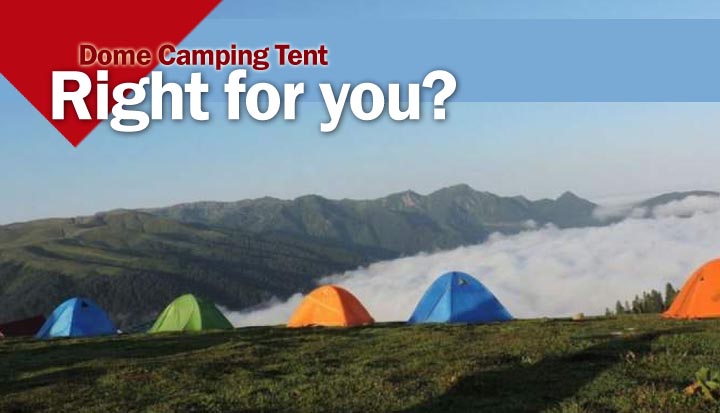When it comes to camping, choosing the right tent is crucial for a comfortable and enjoyable experience. With a wide range of options available, it’s important to consider the specific needs and preferences of you and your group. One type of camping tent that has gained popularity among campers is the dome camping tent.
Dome camping tents are known for their ease of set up, often using a simple and straightforward pole structure. They also offer good headroom and ventilation, providing a comfortable living space while camping. Additionally, they are often lightweight, making them a convenient choice for backpacking and other outdoor activities.
However, it’s important to note that dome camping tents are not designed for extreme weather conditions and may not provide the same level of stability as other types of camping tents. Additionally, they may not be the best choice for larger groups, as they typically have limited floor space.
When determining if a dome camping tent is right for you, it’s important to consider the type of camping you plan to do, the size of your group, and your personal preferences. For example, if you plan to camp in a relatively mild climate and prioritize ease of set up and portability, a dome camping tent may be a good choice. However, if you’re looking for a tent that can withstand harsh weather conditions, you may want to consider a different type of camping tent.
Ultimately, choosing the right camping tent will depend on your individual needs and the type of camping you plan to do. By considering the benefits and limitations of a dome camping tent, you can make an informed decision and ensure a successful and comfortable camping experience.
You can find out some of best Coleman Arch Rock Dome Tents here.
Pitfalls of the Dome Tent design
The biggest problem with dome camping tents is that they do not behave well in strong winds. They can become unstable, shaking violently (which is noisy and distressing) or even breaking. Should one pole break, you loose the basic rigidity that the crossed poles are meant to give and end up with a mess of flapping plastic. Fortunately, such winds are rare and fairly predictable; much more predictable than rain. If you put up your dome tent properly in a sheltered spot and keep an eye on the weather forecasts you have little to worry about.
Dome tents tend to have zips that follow the curved lines of the tent. These are more prone to jamming so either look for a dome tent with straight zips (more likely if there is a porch) or take care when opening or closing the tent. If you do get the zip jammed, take your time to establish which direction you need to pull to restore order. Yanking the zip at random is only going to break the thing, and a repair is not a cheap option.
One minor irritation these days is that dome tents have become so popular that you may not be able to identify yours in the field. You could make some bloke angry if you pop your head in unexpectedly. Think about making your tent stand out (or at least identifiable) without making it less waterproof. You can tie something colourful to the guy ropes or mark the fly sheet. Probably best if you do this near the main entrance where you, and other campers looking for their tent, are likely to see it.
What is dome camping tent?
A dome camping tent is a type of camping tent that features a dome-shaped design. It typically consists of a simple and straightforward pole structure, allowing for easy and quick set up. Dome camping tents provide good headroom and ventilation, making them a popular choice among campers. They are also often lightweight, making them a convenient option for backpacking and other outdoor activities. The interior of a dome camping tent is usually divided into separate rooms or compartments, providing privacy and storage space. Overall, dome camping tents are a versatile and practical choice for campers who prioritize ease of use and comfort.
Here are five highly rated dome camping tents with links to purchase and short pros and cons:
-
Coleman Sundome Tent: Pros: Durable construction, easy setup, affordable price, good ventilation, and spacious interior. Cons: Not the best option for extreme weather conditions.
-
ALPS Mountaineering Lynx Tent: Pros: Lightweight, compact design, sturdy construction, and spacious interior. Cons: May not be the best option for larger groups.
-
MSR Hubba Hubba NX Tent: Pros: Durable construction, excellent ventilation, and high-performance design. Cons: Higher price point compared to other dome camping tents.
-
Big Agnes Copper Spur HV UL Tent: Pros: Ultralight design, spacious interior, and good ventilation. Cons: Higher price point compared to other dome camping tents.
-
REI Co-op Quarter Dome Tent: Pros: Lightweight, easy set up, spacious interior, and good ventilation. Cons: May not be the best option for extreme weather conditions.
Link to buy: https://www.rei.com/product/147578/rei-co-op-quarter-dome-tent
When choosing a dome camping tent, it’s important to consider factors such as the type of camping you plan to do, the size of your group, and your budget to find the best option for you. These tents are highly rated and offer a range of features to suit different needs and preferences.

